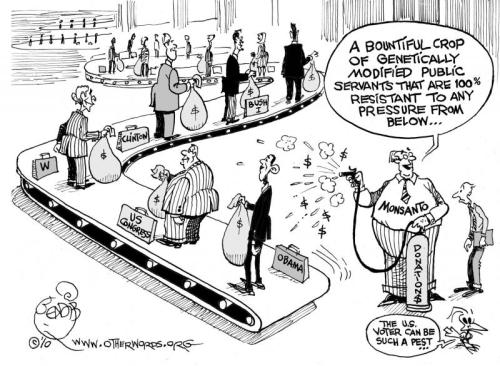This portion of my article focuses on my analysis of Romney and Obama’s involvement with Monsanto and is largely opinion: For the justifications behind these conclusion, please refer to one of the earlier articles.
When all things are taken into account, a Romney presidency is likely better for Monsanto than an Obama presidency: Obama has shown an unwillingness to confront Monsanto, but Romney appears to have a much deeper connections to Monsanto and be more willing to promote things that will actively benefit the company.
Here are a few areas of comparison between the Romney and Obama presidencies in regard to Monsanto:
Donations
While it is often difficult to unravel the massive web of political money, much of which has been filtered through SuperPACs, we know that Romney has taken significantly more money from agro-businesses than Obama. According to OpenSecrets.org, Mitt Romney has taken $4,075,531 in campaign contributions from America agribusinesses, while Barack Obama has only taken $1,377,503 from these interests. As you can see, both candidates are in bed with agribusiness corporations to some degree, but Romney has taken nearly 3X the money that Obama has from this particular industry. It is important to note that these numbers are likely far lower than the actual amounts donated because a majority of the money which is spent by SuperPACs is dark money, where there is no source disclosure. The massive disparity in agribusiness fundraising between the candidates points to the preference of these corporations that Romney get the presidency. As corporations donate money to politicians as an investment and to sway policy in their favor, it is clear that they prefer the Romney vision to the Obama vision.
Partisanship
The president is important, but the legislature is where policy is made; as such, the party affiliations of the presidential candidates can be extremely determinative of the policy that will be passed. Romney is a Republican and Obama is a democrat, and the winner of the presidency will likely be able to sway the national agenda in favor of their party. In the last electoral cycle, the Republicans in the legislature have taken $226,000 from Monsanto Co., while Democrats have taken only $90,500 (for a full list, listed by candidate, follow this link). The Republican Party is based in the center of the country and the south, much of which is dependent upon farming for its primary industry—due to this dependency upon agricultural interest, the Republicans are far more politically friendly towards agribusiness than the Democrats and more likely to support companies like Monsanto.In addition to the partisan funding disparity, it bears mention that the Republican Party is unified around the ideals of lowering taxes and reducing regulations. Reducing corporate taxes and removing regulations (ex. FDA rules), benefits large corporations and their owners, thus these corporations tend to support Republicans more than Democrats.
A Romney presidency will allow the Republicans to pass corporate friendly legislation without fear of veto. This streamlining of the legislative process reduces the difficulty of passing laws (and removing regulations) that benefit Monsanto, and will lead to more favorable outcomes for the corporation—It appears that Monsanto knows this, and has invested its political contributions accordingly.
Regulation
Neither Obama nor Romney appears to be willing to take on agribusiness interests in order to increase regulations, but there is a key difference in their stances: Obama is largely neutral in his actions towards regulations on Monsanto, while Romney is actively invested on deregulating the industry.
Appointments
Both Obama and Romney have shown their willingness to appoint corporate agents to high level advising positions within the government—Obama appointed Michael Taylor to the FDA and Romney has named several Monsanto lobbyists as his agricultural advisory board. At this point, we don’t know who would be worse in regard to appointments, but neither choice is particularly encouraging.

What are your thoughts now, after Obama signed the Monsanto Proection Act?
ReplyDeleteCompletely unchanged.
DeleteBoth Obama and Romney have disastrous records when it comes to standing up to corporate influence, particularly in relation to Monsanto. If Romney were elected, I don't think anybody could claim that he would have vetoed this bill. Obama is simply weak and lacks the courage to make waves through vetoing such legislation, thus he was unwilling to take a stand here.
Basically: This would have happened regardless of whether Romney or Obama were elected but, if Romney were elected, Monsanto would also be enjoying massive corporate tax breaks.
P.S. My blog has moved to: TheProgressiveCynic.com